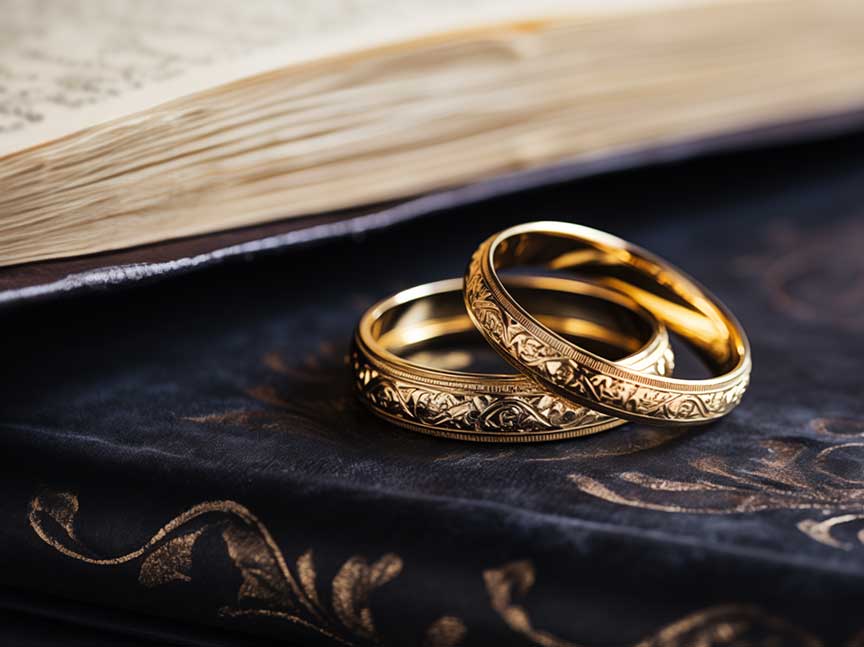|
If you are interested in getting married at St. Paul VI Parish, please visit our Celebrating the Sacrament of Matrimony page.
The sacrament of marriage is a visible sign of God’s love for the Church. When a man and a woman are married in the Church, they receive the grace needed for a lifelong bond of unity. Sacred Scripture begins with the creation and union of man and woman and ends with “the wedding feast of the Lamb” (Rev 19:7, 9). Scripture often refers to marriage, its origin and purpose, the meaning God gave to it, and its renewal in the covenant made by Jesus with his Church.
God created man and woman out of love and commanded them to imitate his love in their relations with each other. Man and woman were created for each other. “It is not good that the man should be alone. I will make a suitable partner for him… The two of them become one body” (Gn 2:18; 24). Woman and man are equal in human dignity, and in marriage both are united in an unbreakable bond. Jesus brought to full awareness the divine plan for marriage. In John’s Gospel, Christ’s first miracle occurs at the wedding in Cana. “The Church attaches great importance to Jesus’ presence at the wedding at Cana. She sees in it the confirmation of the goodness of marriage and the proclamation that thenceforth marriage will be an efficacious sign of Christ’s presence” (CCC, no. 1613). By their marriage, the couple witnesses Christ’s spousal love for the Church. One of the Nuptial Blessings in the liturgical celebration of marriage refers to this in saying, “Father, you have made the union of man and wife so holy a mystery that it symbolizes the marriage of Christ and his Church.” The Sacrament of Marriage is a covenant, which is more than a contract. Covenant always expresses a relationship between persons. The marriage covenant refers to the relationship between the husband and wife, a permanent union of persons capable of knowing and loving each other and God. The celebration of marriage is also a liturgical act, appropriately held in a public liturgy at church. Catholics are urged to celebrate their marriage within the Eucharistic Liturgy. The Sacrament of Marriage is a covenantal union in the image of the covenants between God and his people with Abraham and later with Moses at Mt. Sinai. This divine covenant can never be broken. In this way, marriage is a union that bonds spouses together during their entire lifetime. The sacrament of Matrimony signifies the union of Christ and the Church. It gives spouses the grace to love each other with the love with which Christ has loved his Church; the grace of the sacrament thus perfects the human love of the spouses, strengthens their indissoluble unity, and sanctifies them on the way to eternal life. (CCC 1661) The love in a married relationship is exemplified in the total gift of one’s self to another. It’s this self-giving and self-sacrificing love that we see in our other model of marriage, the relationship between Christ and the Church. Marriage is based on the consent of the contracting parties, that is, on their will to give themselves, each to the other, mutually and definitively, in order to live a covenant of faithful and fruitful love. (CCC 1662) The Church takes the lifelong nature of the Sacrament of Marriage seriously. The Church teaches that a break in this covenant teaches goes against the natural law of God: The remarriage of persons divorced from a living, lawful spouse contravenes the plan and law of God as taught by Christ. They are not separated from the Church, but they cannot receive Eucharistic communion. They will lead Christian lives especially by educating their children in the faith. (CCC 1665) Marriage Reflects the Holy Trinity We believe that God exists in eternal communion. Together, Father, Son and Holy Spirit are united in one being with no beginning and no end. Human beings, likewise, were created by God in God’s image for the purpose of communion with another human being. The Catechism of the Catholic Church states, “The Christian family is a communion of persons, a sign and image of the communion of the Father and the Son in the Holy Spirit” (CCC 2205). The Sacrament of Marriage is “unitive, indissoluble and calls us to be completely open to fertility.” Christian marriage at its finest is a reflection of God’s self-giving love expressed between the love of two people. |
Locations & Contact information
|
Quick LinksMass Schedule
Calendar New to St. Paul VI? Staff Directory Baptism Marriage Funerals Bulletins Donate Archdiocese Covid-19 Updates Connect With UsSearch our site |
© St. Paul VI Parish
Site powered by The Archdiocese of Chicago



